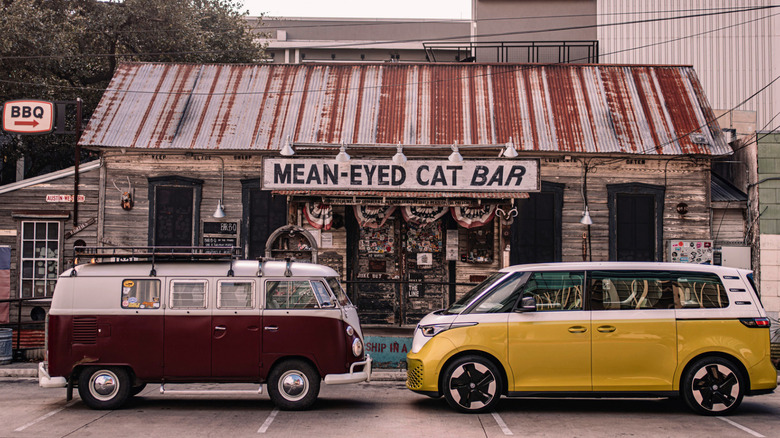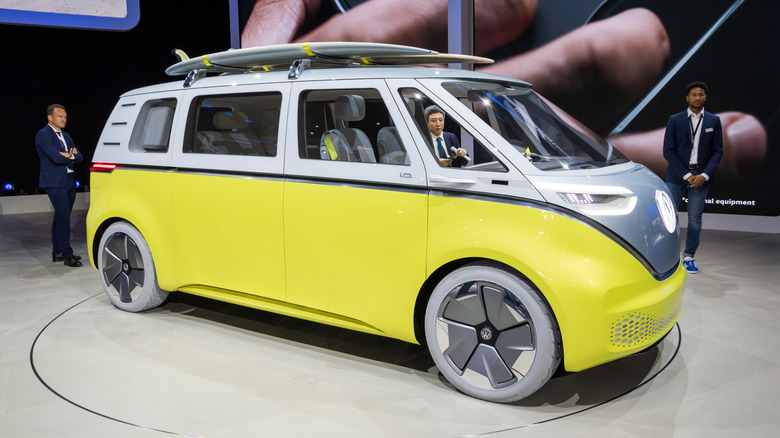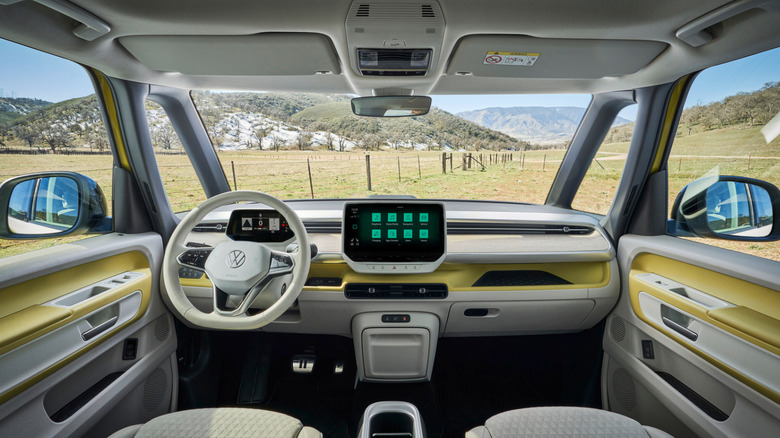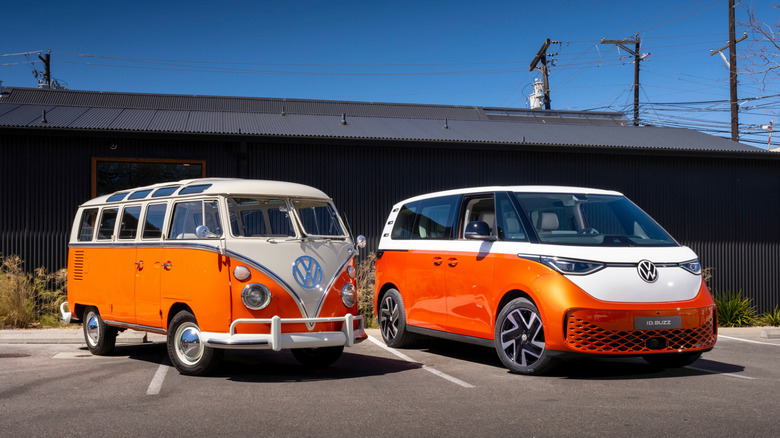The Volkswagen Bus Is Entering A New Era
The Volkswagen Bus is one of the most identifiable automobiles ever sold in the United States. The now-iconic bus from the German automaker entered the American market in 1950 with a slow start, and it didn't gain much traction until the 1960s. It was then that the legacy of the Volkswagen Bus began, a legacy that grew so strong that the vehicle is coming out of retirement — albeit in a very modernized fashion.
Technically speaking, the vehicle was formally called the Volkswagen Type 2 when it first came out, which followed the Volkswagen Type 1 (which is more commonly known as the Volkswagen Beetle). The Volkswagen Bus became a symbol of American rebellion and independence from the norm, and it even became the vehicular mascot for the hippies of the 1970s. It's not uncommon to see well-kept Volkswagen busses still out on the road today.
Talk of a new Volkswagen Bus has been going on for ages, and in 2024, drivers will finally be able to hit the road in the new model.
Introducing the ID. Buzz
The modern incarnation certainly comes in with some flair. The gasoline-powered Volkswagen Busses from the '50s, '60s, and '70s have been replaced with batteries, making the new bus a fully electric vehicle. The name has also changed quite a bit too: Volkswagen has dubbed their new EV bus the ID. Buzz. However, so much more than just names and powertrains have changed. Before we go there, though, it's important to note that the familiar shape of the Bus is one of the few things that has stayed the same. While the Volkswagen ID. Buzz may be mostly different from the original, which has become a pop culture icon thanks to movies like "Little Miss Sunshine," the familiar aesthetic at least makes it easy to imagine the new bus at the center of a few coming-of-age road trips.
And now, on to the new: The revived Volkswagen Bus launches with 201 horsepower and 229 lb-ft of torque, which goes straight to the rear wheels. Volkswagen has confirmed it will have 420 km of range (~261 miles), giving it a 100+ mile range advantage over its closest rival, the Ford E-Transit. However, the highlight of the ID. Buzz isn't its range or its horsepower: It's the technology and character.
ID. Buzz Technology Unpacked
The interior of the revamped bus ditches the analog gauges from the hippie bus for a fancy, new digital gauge cluster. Most of the buttons from the original are now in the form of a 10-inch (or 12-inch) screen, where Apple CarPlay and Android Auto will be available.
Volkswagen is also looking to tap into the self-driving game with the ID. Buzz. They have been testing self-driving versions of the ID. Buzz for some time now, and Volkswagen reportedly plans to have Level 4 self-driving capabilities for the ID. Buzz in the coming years. In fact, Volkswagen is looking to use the ID. Buzz to launch self-driving capabilities for this entire lineup altogether.
The new vehicle comes with a five-seat arrangement, with a three-row version in the works. In the top-of-the-line models, front seats will be fully electric and offer a massaging function. On the back of the front seats are some fold-down tables that rear occupants can use to hold a laptop or other items on a trip.
However, the best part of the ID. Buzz in terms of seating has to do with its loading floor. In most cars, the trunk floor and the seats (when folded down) aren't level. However, Volkswagen has remedied this problem by introducing an (optional) height-adjustable trunk floor to make the loading floor level.
An icon, reborn
There is some bad news, however, for those expecting an affordably-priced option. Pricing is for the ID. Buzz is slated to be around $57,000 after government incentives, the company noted, which is on the steeper side of what people expected. However, these prices aren't confirmed, given that they're based on some conversions from the European market (64,581 euros) — Volkwagon won't release the official prices until early 2023.
Overall, the revival of the Volkswagen Bus is expected to be a huge hit for Volkswagen. The range is right about where it needs to be, and the pricing, while on the steep side of things, is well within the reach of most new EV buyers. However, there could be an interesting situation where buyers could cross-shop a Lucid Air and a Volkswagen ID. Buzz price-wise — though the vehicles are entirely different outside of their shared electric-powered prowess.



